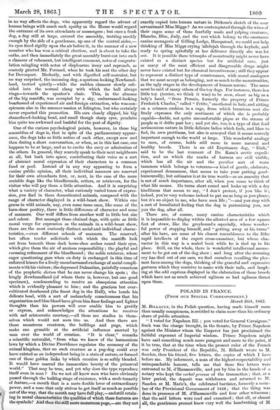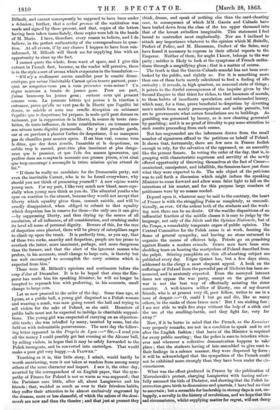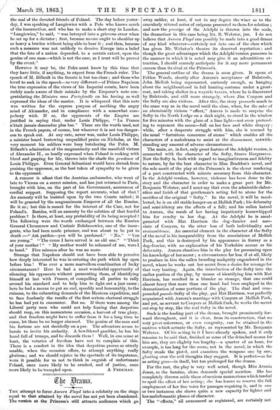POLAND IN FRANCE.
(FROM OUR SPECIAL CORRESPONDENT.) March 261k, 1863. M. BILLAULT, in the Polish question, having made himself more than usually conspicuous, is entitled to claim more than his ordinary share of public attention.
"I voted for Napoleon III.; you voted for General Cavaignac." Such was the charge brought, in the Senate, by Prince Napoleon against the Minister whom the Emperor has just proclaimed the faithful exponent of Imperial wisdom. Prince Napoleon might have said something much more pungent and more to the point, if it be true, that at the time when the present ruler of the French was only President of the Republic, M. Billault wrote to M. Sandon, then his friend, five letters. the copies of which I have before me. My informant, a man of the highest respectability and unimpeachable honour, tells me that these five letters were entrusted to M. d'Ilaussonville, and put by him in the bands of a notary who kept the verbal process of the transaction ; that, at a later period, the deposit was withdrawn and returned to M. Sandon at M. Marie's, the celebrated barrister, formerly a mem- ber of the Provisional Government of 1848; that the thing was done in presence of M. d'Haussonville and four other witnesses ; that the said letters were read and examined ; that all, or almost all, the gentlemen present knew very well the handwriting of M
Billault, and cannot consequently be supposed to have been under a delusion ; further, that a verbal process of the restitution was made and signed by those present, and that, copies of the letters having been taken immediately, those copies were left in the hands of M. Marie. I have, therefore, every reason to believe, and I do believe, in the perfect authenticity of the correspondence in ques- tion. At all events, if by any chance I happen to have been mis- informed, M. Billault will thank me for supplying him with an opportunity to clear up the fact.
I cannot quote the whole, from want of space, and I give this extract in French first, because, as the reader will perceive, there is in the style a sort of aroma which evaporates in the translation:— " S'il n'y a reellement aucun candidat pour le comite demo- cratique, pas meme Pinevitable Carnot qu'on trouve partout, pour- quoi ne songeriez-vous pas b, vous presenter vous-meme ? Un regne nouveau a besoin de jeunes gens. Pour ma part, j'aime beaucoup lea jeunes gem ; surtout ceux qui pensent comme volts. La jeunesse lettree qui pousse is la reaction it outrance, parce qu'elle ne vent pas de in liberte que Pegalite lui donne, se suicide et aura une eruelle deception en subissant l'egalite que le despotisme lui prepare, In seule pent donner en tarissant, par la suppression de In liberte, la source de toute emu- lation, de toute influence, de toute consideration ; en &resent sous son niveau toute dignite personnelle. On y doit prendre garde, car si on parvient is planter l'arbre du despotisme, ii ne manquera pas de chenilles pour monter apres. B eat bien vrai, comme vous le dites, quo des deux &mils, l'anarchie et le despotisme, on oublie trop le second, peut-etre plus imminent et plus dange- reux que le premier, et que l'elu des masses ignorantes, qui prefers dans sea comptes in monnaie aux grosses pieces, n'est ainsi que trop encourage is accomplir In triste mission qu'on attend de lui."
"If there be really no candidate for the Democratic party, not even the inevitable Carnot, who is to be found everywhere, why should you not think of presenting yourself ? A new re'gime wants young men. For my part, I like very much new blood, more espe- cially when young men think as you do. The educated youths who spur on reaction to the utmost, because they would not accept that liberty which equality gives them, commit suicide, and will be cruelly disappointed, when obliged to submit to that equality which despotism has in reserve for them—the only one it can give —by suppressing liberty, and thus drying up the source of all emulation, of all influence, of all consideration, and crushing under its level all sense of personal dignity. Beware of this, for the tree of despotism once planted, there will be plenty of caterpillars eager to climb up upon the trunk. It is perfectly true, as you say, that of these two rocks, anarchy and despotism, people are too prone to overlook the latter, more imminent, perhaps, and more dangerous than the former, and that the elect of the ignorant masses who prefers, in his accounts, small change to large coin, is thereby but too well encouraged to accomplish the sorry mission which is expected from him."
These were M. Billault's opinions and sentiments before the coup d'etat of December. It is to be hoped that since the Em- peror has made him his speaking Minister, he will no longer be tempted to reproach him with preferring, in his accounts, small change to large coin.
Let us now proceed to the order of the day. Some time ago, at Lyons, at a public ball, a young girl disguised as a Polish woman and wearing a mask, was seen going round the hall and trying to sell violets for the sake of Poland, as she said. Haunters of public balls must not be expected to indulge in charitable supposi- tions. The young girl was suspected of carrying on an objection- able trade ; she was rebuffed by many, taunted by some, but she held on with indomitable perseverance. The next day the follow- ing letter appeared in the Progre,s de Lyon :—" Sir,—I send you all the money I could possibly get last evening at the Alcazar ball, by selling violets, in hopes that it may be safely forwarded to the Polish insurgents, and be converted into cartridges. That would make a poor girl very happy.—A FLOWER."
Touching as it is, this little story, I admit, would hardly be worth mentioning, were it not taken at random from among many others of the same character and import. I saw it, the other day, asserted by the correspondent of an English paper, that the sym- pathy of France for Poland is not so warm as was supposed ; that the Parisians care little, after all, about Langiewicz and his friends ; that, wedded as much as ever to their frivolous habits, they suffer their attention to be almost exclusively engrossed by the dramas, more or less shameful, of which the salons of the demi- monde are now and then the theatre ; and that just at present they
think, dream, and speak of nothing else than the card-cheating ease, in consequence of which MM. Garcia and Calzado have been hurled down from the class of the ten upper thousand into that of the lowest swindlers imaginable. This statement I feel bound to contradict most emphatically. Nor am I inclined to attach any importance whatever to the opinion which M. Boitelle, Prefect of Police, and M. Hausman, Prefect of the Seine, may have found it necessary to express in their official reports to the Emperor. Neither of them, for aught I know, belongs to the war party ; neither is likely to look at the symptoms of French enthu- siasm through a magnifying glass ; that is a matter of course.
The truth is that the Garcia-Calzado scandal has not been over- looked by the public, and rightly so. For it is something more than one of those facts merely calculated to feed a feeling of idle curiosity ; it reveals, in high quarters, an unsound state of things ; it points to the direful consequences of the impulse given by the Second Empire to that thirst for riches, to that looseness of morals, to those habits of inordinate speculation and unbounded luxury, which may, for a time, prove beneficial to despotism by diverting men's minds from manly preoccupations and noble pursuits, but are to governments what rotten foundations are to buildings. As gambling was generated by luxury, so is now cheating generated by gambling; and it is no proof of frivolity to pay some attention to" - such results proceeding from such causes.
Not less ungrounded are the inferences drawn from the small number of signatures affixed to the petitions on behalf of Poland. It shows that, fortunately, there are few men in France foolish enough to rely, for the salvation of the oppressed, on an assembly like the present Senate. In voting the order of the day, that is, in grasping with characteristic eagerness and servility at the newly offered opportunity of throwing themselves at the feet of Caesar— omniscient, omnipotent, and infallible, the Senators have just done what they were expected to do. The sole object of the petii ions was to call forth a discussion which might induce the speaking Minister to come forward and allow some faint light to fall on the intentions of his master, and for this purpose large numbers of petitioners were by no means needed.
Depend upon it, whatever may be said to the contrary, the heart of France is with the struggling Poles as completely, as uncondi- tionally, as ever. Of the ardour both of the students and the work- ing men there can be no doubt. Of the warlike dispositions of an influential fraction of the middle classes it is easy to judge by the language, not only of the Sacle and the Opinion Nationale, but of the Temps, a remarkably temperate organ of public opinion. The Central Committee for the Polish cause is at work, fanning the flame of general sympathy, and leaving no stone unturned to organize the means of efficient help. Priests go on preaching against Russia a modern crusade. Grave men have been seen shedding tears on hearing the martyrdom of Poland described from the pulpit. Stirring pamphlets on this all-absorbing subject are published every day. Edgar Quinet has, but a few days since, addressed to the clergy a most eloquent appeal. A book on the sufferings of Poland from the powerful pen of 11lichelet has been an- nounced, and is anxiously expected. Even the moneyed interest dares not oppose the war party, except on the ground that war is not the best way of effectually assisting the sister country. A well-known soldier of liberty, one of my dearest friends, who is at present very ill, poor fellow, writes to me in a tone of despair :—" 0, could I but go and die, like so many others, in the ranks of those brave men ! But I am sinking fast ; I am not able to walk five steps without the help of a stick and the use of the smelling-bottle, and they fight far, very far away !"
Now, if it be borne in mind that the French, as the Examiner very properly remarks, are not in a condition to speak and to act after the English fashion ; that leave of the Minister is required for every public meeting ; that the police is sure to interfere when- ever and wherever a collective demonstration happens to take place ; that the students having of late assembled to give vent to their feelings in a solemn manner, they were dispersed by force ; it will be acknowledged that the sympathies of the French could not be exhibited more strongly than they have been under the cir- cumstances.
What was the effect produced in Franee by the publication of Mieroslawski's protest, charging Langiewicz with having unlaw- fully assumed the title of Dictator, and showing that the Polish in- surrection gave birth to dissensions and quarrels, I have had no time to ascertain; but a scramble for leadership in stormy days is not, un- happily, a novelty in the history of revolutions, and we hope that this sad circumstance, whilst supplying matter for regret, will not damp the zeal of the devoted friends of Poland. The day before yester- day, I was speaking of Langiewicz with a Pole who knows much of the insurrection, and who has to make a short stay in London. "Langiewicz," he said, "was betrayed into a grievous error when he set up for a dictator ; first, because no one ought to shoulder up so heavy a burden without being able to bear it ; and then, because such a measure was not unlikely to deceive Europe into a belief that the fate of a nation depended, to a certain extent, upon the genius of one man—which is not the case, as I trust will be proved by the event."
However it may be, the Poles must know by this time that they have little, if anything, to expect from the French ruler. The speech of M. Billault in the Senate is but too clear ; and those who loved to seek in the speech—so very different—of Prince Napoleon the true expression of the views of his Imperial cousin, have been rudely made aware of their mistake by the Emperor's note con- gratulating the Ministre sans Portefeuille on his having so well expressed the ideas of the master. It is whispered that this note was written for the express purpose of soothing the angry mind of Alexander, and in compliance with a somewhat com- pulsory wish. If so, the opponents of the Empire are justified in saying that, under Louis Philippe, "La France n'etait janaais descendue plus bas.'' These are the words used, not in the French papers, of course, but wherever it is not too danger- ous to speak out. At any rate, never was, under Louis Philippe, a minister heard bestowing unqualified praise on Nicholas, at the very moment his soldiers were busy butchering the Poles. M. Billault's admiration of the magnanimity and the manifold virtues of Alexander II., so loudly expressed when Poland is reeking with blood and gasping for life, throws into the shade the prudence of Louis Philippe. Even General Sebastiani would have shrunk from praising the oppressor, as the best token of sympathy to be given to the oppressed.
A rumour is afloat that the Austrian ambassador, who went of late to Vienna on a secret mission, and has just returned to Paris, brought with him, on the part of his Government, assurances of cordial support. Supposing the report accurate, what of that ? An amnesty will be insisted upon by the two Courts united ; it will be granted by the magnanimous Emperor of all the Russias. Be it so ; but this is meant for the interest of the Czar, not for Poland's. Besides, will an amnesty be the solution of that fearful problem ? Is there, at least, any probability of its being accepted? The following were the words exchanged between the Russian General Chruszczew and Casimir Bohdanowicz, one of the insur- gents, who had been made prisoner, and was about to be put to death :—" Ask pardon—you will be pardoned." "No." "You are young." "The cause I have served is an old one." "Think of your mother ! " "My mother would be ashamed of me, were I to bend." Five minutes after he was no more.
Strange that Napoleon should not have been able to perceive how deeply interested he was in entering the path which lay open before him ! Was ever a more marvellous combination of lucky circumstances? Here he had a most wonderful opportunity of silencing his opponents without persecuting them, of identifying himself at last with France, of compelling all parties to rally around his standard and to help him to fight out a just cause ; here he had a means to put an end, speedily and honourably, to the ruinous, to the exhausting demands of the Mexican expedition, and to face fearlessly the results of the first serious electoral struggle he has had yet to encounter. But no. If there were among the Liberal party men who could not help fearing that despotism should reap, on this momentous occasion, a harvest of true glory, and that freedom might have to suffer from it for a long time to come, let them be no longer alarmed. The genius of the man and his fortune are not decidedly on a par. The adventure seems to heroic to invite his audacity. A bewildered gambler, he has his band full of trumps, and he discards them ! Well, in one sense at least, the votaries of freedom have not to complain of this. There is a comfort in the idea that despotism proves so utterly unable, when the occasion offers, to attempt anything really glorious ; and we should rejoice in the spectacle of its impotence, were it possible for us not to think in anguish of unfortunate Poland, once more likely to be crushed, and of justice, once
































 Previous page
Previous page